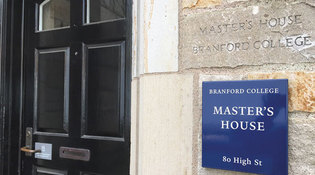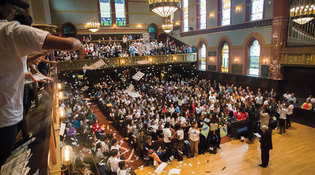 loading
loading
What’s in a name? Now that the term “master” has been replaced with “head of college,” some campus signs (above) will need changing. View full image Alex ZhangAt a forum in Battell Chapel, some students dropped fake money from the balcony when President Peter Salovey ’86PhD appeared. They were protesting the influence of a donor in naming Benjamin Franklin College. An extended discussion followed; many students expressed anger and disappointment. View full image“Master”The debate over the title “master” for the heads of residential colleges also came up in the aftermath of the Charleston murders. In August, Pierson College master Stephen Davis asked his students not to address him with the term, because of “deeply problematic racial and gender hierarchies associated with the title” and discomfort he had witnessed in some guests. During the fall protests over race, Yale students included the retirement of “master” in the list of demands they presented to the administration. The reason the administration elected to change the title, says Salovey, goes back to the question of “the history that you’re hiding or teaching by retaining or changing” a name or term. In his statement to the Yale community, Salovey noted that the word master “derives from the Latin magister, meaning ‘chief, head, director, teacher.’” He wrote, “some members of our community argued that discarding the term “master” would interject into an ancient collegiate tradition a racial narrative. . . . Others maintained that regardless of its history of use in the academy, the title—especially when applied to an authority figure—carries a painful and unwelcome connotation that can be difficult or impossible for some students and residential college staff to ignore.” But unlike the choice of Calhoun as a college namesake, he told a group of alumni, it has no fundamental part in Yale’s history—having been borrowed from Oxford and Cambridge in the 1930s—and he saw little educational value in keeping it. The decision, he said, was made after extensive conversation with students, faculty, and staff; and the Council of Masters (now the Council of Heads of College) had proposed the change earlier in the academic year. Of the respondents to our reader panel survey who expressed an opinion, a slim majority oppose changing the title “master” to “head of college”; the panelists’ reactions ran the gamut from enthusiasm to indignance, with a good deal of indifference and resignation in between. Richard Makover ’60 called it “a silly decision, showing the pernicious influence of political correctness on the supposedly intellectual free and open atmosphere of a great university.” Katie Eggers Comeau ’95 is “strongly in favor of this change. I realize the term was not derived from slavery, but I still believe it is inappropriate in today’s context, particularly if the holders of the title themselves were uncomfortable using it.” Several heads of residential colleges declined to comment for publication on the change. But English professor Traugott Lawler—who tried (unsuccessfully) to get his students to call him “Mr. Lawler” when he was the incoming master of Stiles in the 1980s—says, “I’m pleased. ‘Head’ seems just right.” New college namesThe issue of the two new colleges had been debated for years. Many students and alumni had argued for honoring people of different ethnicity or gender from the namesakes of the existing colleges. Many others had urged the university to base its choice solely on achievement, and pick the most accomplished alumni possible. Others pointed out that a few of the original namesakes weren’t necessarily great men, just men closely connected with Yale history. Before the announcements, some expected Bouchet and Grace Hopper ’34PhD to be honored; both had been much celebrated by the university in the years leading up to the decision and were already well known on campus. Other candidates often mentioned were Yung Wing, Class of 1854, the first Chinese national to graduate from a US college; Noah Webster, Class of 1778; and J. Willard Gibbs, Class of 1858, ’63PhD. Benjamin Franklin and Pauli Murray were not on most people’s short lists. Unlike Pauli Murray, Benjamin Franklin is one of the best-known names in the United States. But Franklin’s choice as a college namesake was just as surprising as hers—mainly because it represents a departure from Yale tradition: most of the other colleges were named for people and places with deep ties to Yale and New Haven. (Trumbull College was named for Connecticut governor and Revolutionary hero Jonathan Trumbull, who went to Harvard but got an honorary degree from Yale.) Franklin is far more closely associated with the University of Pennsylvania, which he founded. His ties to Yale include an honorary degree in 1753, a long correspondence with Yale president Ezra Stiles, his donations to the library, and the fact that the largest collection of his papers is housed and edited at Yale. In his announcement, Salovey helped explain the decision by noting that Franklin was “a personal role model” for Charles Johnson ’54, whose $250 million gift to help fund the residential colleges is one of the largest in Yale history. Salovey has said repeatedly that although Johnson suggested the name, it was not a condition of his gift. The name came in for some criticism. Some students expressed disappointment that another college was being named for a slaveholder (although Franklin renounced slavery and worked for abolition late in his life), and others were unhappy about the donor’s perceived influence over the naming process. Posters appeared on campus bulletin boards suggesting that the college should have been named for singer Aretha Franklin (who also has an honorary degree from Yale). And a large group of students showered fake money—a comment on the donor’s role—from the balcony of Battell Chapel when Salovey appeared at a student forum there after the naming decision. The reaction of our reader panel was mixed. About half were either happy with the name or, even if not entirely happy, said it was appropriate for the donor’s wishes to be honored. “A marvelous decision!” wrote Mark Reed ’72. “Franklin occupies an enormously significant position in our nation’s founding years, never mind his groundbreaking scientific breakthroughs and his other philanthropic endeavors.” Joan Turek ’68PhD said the decision was “worth the money. He should get something in return for his generous gift. Ben Franklin is a respectable choice.” An equal number, though, said they were disappointed by or opposed to naming a college after Franklin. “When I learned that Mr. Johnson’s [mutual fund] company is Franklin Resources, I became downright angry,” wrote Gretchen Schmidt Bishay ’90. “Yale should not be providing marketing opportunities.” Franklin has “the remotest connection to Yale,” noted James D. Bratt ’78PhD. “Surely there was someone more germane to Yale’s history.” Alumni offered strong opinions on both sides of the issue. Many criticized the idea. “I think this name is appropriate,” wrote John Reichenbach ’80. “However, I am surprised that a more towering woman in Yale history could not be found. My guess is that she was chosen because of the multiple constituencies she represents.” Philip Kantor ’75 found the choice “baffling. Identity politics run amok.” They weren’t alone: a number of people, even those who liked the idea of a college named after a woman or person of color, complained that Murray was simply too obscure to receive such an honor. (Others who objected that they’d never heard of Murray also observed that, in all fairness, they had never heard of Silliman or Stiles before they came to Yale.) But most respondents to the magazine’s questions cheered the move. Bruce Murrie ’66—who also applauded the Calhoun decision—exclaimed: “I like this very unanticipated, interesting, and thoughtful choice!” Richard D. O’Brien ’80 wrote, “I love it. A powerful statement.” Genevieve Fu ’05MArch wrote, “This decision makes me feel that my alma mater is aligned with my values.” Nancy Exume ’90 had possibly the most moving response:
Almost immediately after the decisions were announced, the linguistics department put a new page up on its website, titled “Yale Linguistics Diversity Initiative.” In the wake of Yale’s decisions to retain “fierce slavery advocate John C. Calhoun” and to add Franklin, the page explains, the department has “begun an initiative to recognize the contributions of people of diverse backgrounds to our field, our department, and the university.” The linguists named six rooms in their space, including tutors’ rooms and the library, after five women and one nationalized Chinese American man. The page provides short bios for each. There are probably few other places where one can stumble on the information that the 1964 Thai-English dictionary by Mary Rosamund Haas ’35PhD is still considered an authoritative text; or that Kay Williamson ’64PhD has been called “the mother of Nigerian linguistics.” It seems the process of educating Yalies on our history has already begun.
|
|